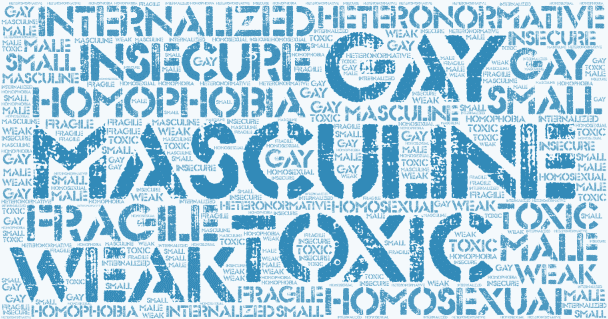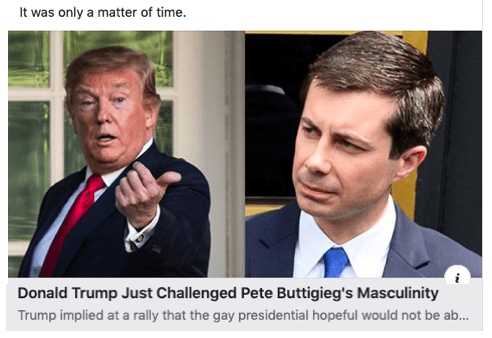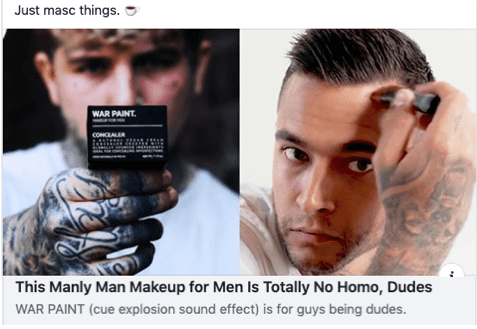
Masculine. In my lifetime and especially in my gay out and proud time, the word masculine has increasingly become more of a bad and questionable word in the LGBT community.
This week, there were a couple of stories that had me questioning my masculinity, well, not my masculinity, but my ability to use the word or forms of it. I’m shocked as much as you are that I am using masculinity in a post in 2019 without the word toxic or fragile in front of it, for that seems to be the only way we can use the m-word these days.
One of the first posts I saw was:
Donald Trump Just Challenged Pete Buttigieg’s Masculinity.

Let’s go see what this is all about. The story was based on this tweet which included President Trump speaking about his possible Democratic competitors.
President Donald Trump goes after Pete Buttigieg for the first time. "He's got a great chance, representing us against President Xi of China. That'll be great. I wanna be in that room. I wanna watch that one." pic.twitter.com/EcH3wwemRv
— Evan Semones (@evansemones) May 9, 2019
Did I miss something? Was there more to the video? Now I am faaaaaar from supporting or defending #45, but we need to be truthful. Wasn’t his doubt about Buttigieg’s abilities in regard to his age? Did this video have any evidence of The Donald going after Buttigieg based on his masculinity or sexuality? Was the point of the article that Trump had better not go after a gay guy’s masculinity?
Apparently, this is an example when the m-word is okay to use in reference to a gay man. We need to protect Mayor Pete’s masculinity, even though it wasn’t challenged. Many of us jumped on that band wagon to yell, “PETE IS MASCULINE! He’s a man and just as masculine as every other male politician in the race!” just to put down President Trump.
Masculine = good for Pete to be. Okay, got it.
But the other anti m-word post that had me scratching my head was not raising masculinity up onto a pedestal for us LGBTers to protect, but slicing it down and covering it in a glitter concealer.
This Manly Makeup for Men is Totally No Homo, Dudes

Looking at adverts for this make-up line, I once again seem to be missing the point. Is it so wrong that a (hu)man doesn’t want to buy a pink bottle of make-up? Is it so wrong that a man desires to still look manly and masculine? Even if the product is the same as, better or worse than other companies that sell make-up for men, but just don’t ever advertise it. Are we saying it is bad for someone to be buying a product that helps them identify with, well, the gender they identify with especially if it is *gasp* a masculine man! If it is wrong, then we may need to change all of the women’s adverts that show women looking all pretty and feminine?
In the same pages on social media where we are knocking down men wearing concealer marketed toward men, we gravitate to, are in awe of, and raise up on a pedestal transgender men that look “better” and more masculine than most cis men. Yay for transgender masculinity, but boo for any cis straight, gay, or bisexual man talking about his masculinity. If those SGBs are doing that, it’s got to be toxic and bad for everyone!
The anti-War Paint article from a gay publication states:
“but this binaried marketing strategy seems like thinly veiled homophobie and femmephobia”
I left the judgment and the spelling error in the quote. And it is not just gay media mentioning the company being labeled as overly masculine. The NYPost ran this:
Male makeup brand War Paint slammed as ‘fragile masculinity’
We applauded James Charles for becoming the first male Covergirl model (now having some follower issues), why can’t we also recognize other men for being in make-up commercials. Do they have to be more glitterfied to be LGBT accepted? Are we forcing toxic masculinity onto them? They had better tone it down and stop scratching their balls or else we won’t accept them! James Charles dazzled on his part of the LGBT rainbow, why can’t we let other men be on another spot of the make-up world without attacking their place on the masculinity scale?
I am sure someone will try and call me out and attack my fragile, toxic, disgusting, small, insecure masculinity or some banal thinker will blame my opinion on internalized homophobia. Oh wait, I forgot about me growing up in a heteronormative world and that has shaped all of my opinions and beliefs and has locked my brain into an evil and unaccepting mode. Yeah, when people use heteronormative, they always feel they won the argument, as well as Scrabble.
And don’t get me wrong. Of course, there is toxic masculinity and fragile masculinity and man other quantifiers that go along with it, but all masculinity does not need to be good, bad, or labeled. Being proud of your masculinity does not all of a sudden cast a dark dank shadow upon the rest of the community. Wanting to embrace your masculinity does not mean you are degrading others in the rainbow family.
So to recap, do we raise the pitchforks to protect Mayor Pete’s masculinity which wasn’t even questioned while we point our judgmental eyes and sharp objects at a company that offers a product geared toward men and allowing them to feel better about themselves?
If you’re accepting of people being, gender fluid, feminine, non-binary, and all the other colors, hues, and levels of the rainbow, then you need to allow others to be masculine without the prejudgment and prefixes.
This is the opinion of one of the contributors to Instinct Magazine and may not reflect the opinions of other contributing writers or the magazine.


Regarding the make-up ad and your question about possibly having missed the point, the answer is “yes.” You did indeed miss the point. First, the ad falsely equates gender and sexuality. The two are not the same, which leads to the second point. The ad phrase, “This Manly Makeup for Men is Totally No Homo, Dudes,” makes use of the tired old stereotype that Gay men are effeminate weaklings. From one masculine Gay man to another, I’m surprised that you’re apparently not bothered by that. I’m even more surprised that you devoted half of an article to defending an ad that basically mocks homomasculinity.
Thanks for the comment Jacob. Now you missed the point. The gay magazine that ran the piece about the make-up company, they are the ones that put in the phrase “This Manly Makeup for Men is Totally No Homo, Dudes.” It is not from the make-up company but the magazine. Both of the examples I tried to shine a light on are the creation of gay media, protecting Buttigieg’s masculinity when it did not need to be protected and throwing “no homo” onto an ad campaign where it wasn’t. The magazines were using masculinity to make an issue where there wasn’t one.